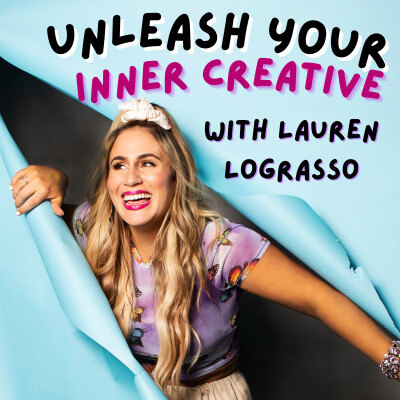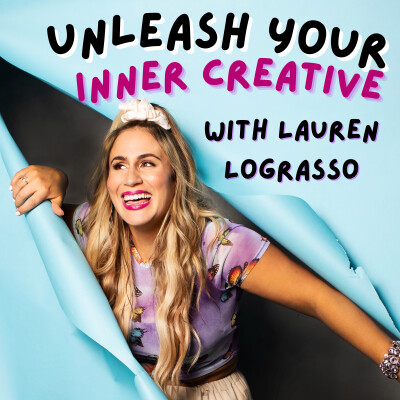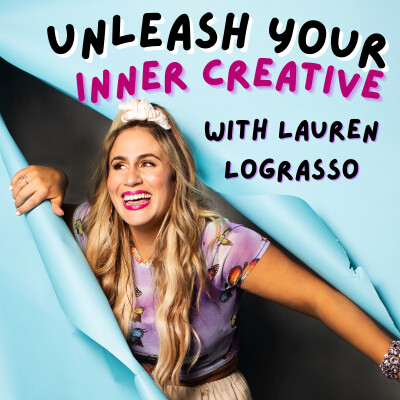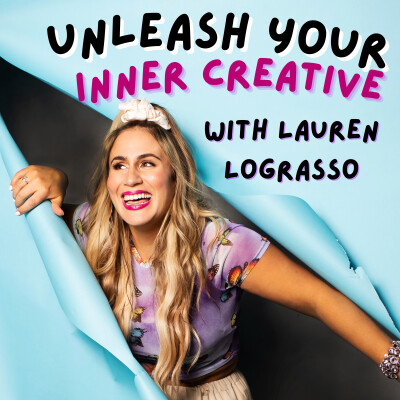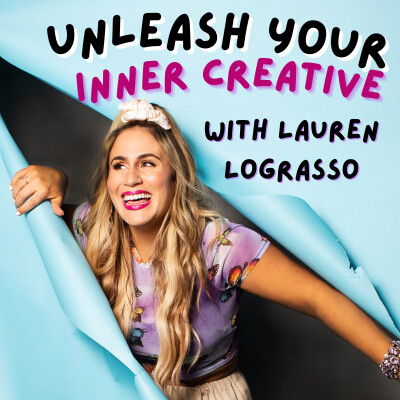Speaker #0Do you have a story or a memory from your early creative life that still gives you a sting when you think about it? And how do you think it might be holding you back? Creative Cutie, today we're talking about the concept of creative wounds. I've talked about them a lot on the show, but we've never deep dived into them. So we're going to go through what they are, how they might be holding you back, how to find and pinpoint yours, and ways to begin to heal. Welcome to Unleash Your Inner Creative with Lauren LaGrasso. I'm Lauren LaGrasso. I'm a Wubbby Award-winning podcast host and producer, singer-songwriter, public speaker, and creative coach. And this show is meant to give you tools to claim your birthright to creativity, redefine your relationship with fear, and love, trust, and know yourself enough to go after whatever it is that's on your heart. Yes, indeed. Today, we're talking about creative wounds. You've heard me talk a lot about these on the podcast at this point, but I realize I've never clearly defined it and shared what it means to me and how I work through them in my own life. And I recently had an experience where I uncovered a pretty deep creative wound that I think I've been repressing or at least trying not to deal with. And it has been fruitful in moving through that and starting to heal from it. So I wanted to bring it up because of that. And also because I recently did a keynote, it was amazing, at a WISE workshop at ITC in Las Vegas, the Mandalay Bay. And we did a whole section on finding your creative joy, which is so important, and also on healing creative wounds. And when I start out with a coaching client, this is often, and most often, the first place where I start because I believe that The topic we're meant to speak on, the creative thesis statement, is somewhere at the middle of our greatest joy and our greatest suffering, and often sourced from a moment of creative suffering. So I love doing this because it is just as important as remembering the inner child for the joyful moments. It's important to remember and heal the inner child for the moments that were hard and that made them think differently about themselves. So first, what is a creative wound. Simply put, a creative wound is a creativity-related trauma that holds you back from fully unleashing your creative self and pursuing your goals and dreams. A creative wound is something I define as a time in your younger life where that joyful, creative self was rejected, humiliated, or told to get smaller and crunch up. It's a time when you silence your creative self, and sometimes we are still stuck in that moment, reenacting it. in other situations where our creativity is supposed to be used or stifled by it from moving forward. It's like you're living out this limiting story that is untrue, like any other trauma. Now, most often the creative wound isn't a capital T trauma, but it is something that like horrified younger, creative, excited self enough to stay small in some way and not put yourself out there. It can be a moment of deep disappointment, a feeling of failure that stunted you. Sometimes it is a singular moment, or sometimes it's a lot of separate moments that created a sense of loss when it came to your creativity or feelings like you couldn't do it or rejection. So the truth is, we're often subconsciously being run by these wounds or trapped in these moments without realizing it. And this is where acknowledging them, naming them, and starting to move through them and heal them really helps you move forward in your creative career or just in expressing your creativity. In order to better explain what this is, I'm going to share a few of mine so that you can get a feeling for what I might be talking about. And these range from like a silly little thing that made me feel bad when I was really little to something that was like pretty traumatic that I actually just recalled. So the first one that I'm going to share is when I was three. I was in preschool and it was show and tell. And everybody was asked to share a workout routine. Like what is an example of working out? And I was super excited because my mom always did these side bends. And I thought that they looked really cool when she did them. So I was expectantly, I got up in front of class and I started doing the side bends and showing like, this is what it looks like. And this is a great workout. And everybody in class laughed at me. And I was only... three and this still sticks out in my mind. So this was a moment when I shared myself. I got so excited to share. I knew what I was doing was a workout and it was right, but everyone else laughed. And it's my first memory of embarrassment. So this is an example of a very small creative wound. Another one was when I was in choir in high school and I had a really, I've talked about it on the podcast, but a really tough, honestly, slightly mentally abusive choir teacher. And she had asked, okay, everybody who's in the class, get up and sing your part in this song. I happen to be an alto. It's the harmony part. I sang the first three notes. And on the fourth note, she's like, sit down. And she told me that I couldn't hold a part. And so that like now every time I go to sing harmony, I have that in my head. And so this is a moment that I'm working on healing because it's frankly untrue. I can hold a part. And it was one moment in time that she tried to let define me. Right. So that's another example. The most recent one that came up for me was a surprise, and this is ultimately why I'm sharing this topic with you. As I mentioned, last week I did a speech on the power of unleashing your creativity, and one of the steps is healing the inner child and finding the inner child's joy. And the day before we left for Vegas, I had done a test run of the speech for Timmy, my husband, and I recorded it on voice memos on my phone so I could listen back to it the next day and, And, you know. integrate it further into my memory and mind. And so we were flying to Vegas and I was listening to it and I was reading along with my speech at the same time. And it got to the point where I talk about creative wounds. And in this section, I actually do a visualization with people. And as I'm doing the visualization, I'm like, well, I might as well listen to it and see if it actually works, you know, because the weird thing, if you've ever done a visualization or a meditation. for somebody else, like recorded one, you're not doing it with the person. So if you don't do it for yourself, like I had already had other people do it who told me it worked, but I was like, I want to test, I want to get high on my own supply and test this out. And so I started doing the visualization and I was absolutely shocked at what came up. This was a moment that I've often thought about, but do you ever think about something and just... not let yourself feel it. Like I think about it, but then I glaze over it because it's too intense. It's too painful. And I don't think I could even start to like unpack what it meant to me. But the moment that came up was when I was 26 and I was, I had just gotten my job at Sirius XM and I was on air hosting and producing. And I had just reached an end of the road with acting. I felt like I had given it my all. I had tried so hard. I was so deeply disappointed and hurt by all the rejection and how much of my heart I had put in and how little I had gotten back. And I remember calling my parents, pacing around, because my roommate at the time, David, had just moved out and I was just living alone in this two-bedroom apartment, pacing around this. this room that was David's, calling my mom and dad and saying, I can't do it anymore. I can't do it anymore. I have to stop. I have to stop. And I was telling them, like, I love it so much, but I have to stop. I have to stop. And I meant I have to stop acting. And this was wild to me because first of all, whenever I would do the creative wound meditation in the past, it was always like someone else was doing something to you. right? But this memory that came up wasn't anything anyone did to me. It was like a time when all this like collective pain over my relationship to this like creative and artistic exploit that I loved so much came to an end. And even though I was deciding, I felt like life had taken it away from me or something. And I'm still unpacking how I feel about it because obviously I'm not speaking super eloquently about this right now. I think that the reason it came up is because if you haven't listened to a few episodes back, I've recently gotten representation when it comes to acting. I have an acting agent, which is wild. And I think it's bringing up some of those past pains for me. And it's time to confront them so that I can actually approach this with a fresh energy, not bringing the baggage of the past in. But I cried during the visualization I did for others. It worked. It worked on me. Two thumbs up for rock and roll. And I've been unpacking it since then. You know, when I told my parents about it the other night, I cried telling them about it, like recalling the memory. And I've brought it into therapy now. So all that's to say, this stuff does work. And what I would like to share with you now is that. visualization that I did. And I want to say one thing. I am not a therapist. This is not like something that is regulated by the American Academy of Therapists. I don't even know if that's a thing. This is something I made up to help myself and to help others, to help the people that I coach. But it is not meant to be a time to like face the deepest, darkest things that ever happened to you. It's a time in your younger life, either in your childhood or for me. in my mid-20s where some sort of disappointment, pain, humiliation, failure happened that you're now letting, even subconsciously, control how you go toward your creativity in your life, okay? But that said, just take care of yourself throughout. If you feel like you need to pause, if you don't feel it's safe for you, trust your own instinct. always trust yourself over me or anybody else who's telling you to do something. That's all I wanted to say. That said, I was told like this was one of the top things that people in the seminar came back to me and said was helpful. So it's helped others. It's helped me. And as long as you have a commitment to taking care of yourself through it, you will be absolutely fine. Okay. So this is a visualization to heal a creative wound. And if you are not in a place where you can close your eyes. I would pause it right now and wait to come back to it until you are in a place where you can close your eyes. So do that. And now close your eyes. Take a deep breath in and out. Roll back your shoulders and relax your body. and mind. Now bring your memory back to an early creative heartbreak, rejection, or wound. Trust whatever comes up first. What is this moment for you? What is happening? Where are you and how old are you? What was said, done, or happened that made you feel less than or like shrinking? Feel what it felt like in your body. in your heart to have that happen to you? What message did you get about who you are and your creative capabilities or your ability to achieve your goals from this moment, from this wound? What meaning have you given to that situation since then? And in what ways has it held you back? What is the story? Now, see your younger self and see a version of your older self, your current self. walking into the scene where they are. Your younger self is expecting you and excited to see you. If there's someone around you who contributed to this moment of wound, you can stand up for your younger self to that person. Tell them how wrong it was. Now turn to your younger self. and tell them that they're good, they're enough, and they're safe. Rewrite the story to be the most empowering version for both your younger self and yourself today. Let the younger version of you know that they are good and capable. Now, if you feel called, give them a hug. And as you hug them, you energetically become one, remembering your every age you've ever been. And you can protect them now. They're safe to create, believe in themselves. And remember their joy before they felt the wound. You're healing now. And when it feels right, put your hand on your heart, seal this up, and blink open your eyes and come back to the room. So it can be pretty intense. But if we don't identify these moments, figure out what meaning we've given to them since then, and in what ways we're still back in that moment, held to that old story and that old pain, we're subconsciously carrying it through to every time we try something new or put ourselves out there in the world. And so it's important to know what these times are. what the story is with them and how to begin to heal it. I highly recommend just take a moment to write down what scene came up for you from your past, what the story was that you've been telling yourself since then. And if any messages came through on what you want to start healing or how you can start healing it, that is really important. With the inner child, it's just as important to remember the moments of early creative joy. and moments of creative pain and to spend time both feeling the joy and healing the pain. Because when it comes to adulthood, the problem is that the inner child is in charge when it shouldn't be, and it isn't in charge when it should be. So when it comes to trauma and triggers and creative wounds, the inner child is often the one running the show. It's acting out old pains, it's reacting from fear, and it's trying to protect us the only way it knows how. But then when it comes to our dreams and creativity and putting ourselves out there, that same inner child is silenced, shut down, told it's silly, immature, and that it should just shut up. The way to healing is really in putting the inner child in its proper place. So when it comes to creativity and dreaming, you let it lead. You let its voice be the first one you hear. That's where their wisdom shines and where our adult selves can really get in the way. And when it comes... to trauma, pain, and healing, we call on the wise adult to let our grounded, compassionate, older self take the reins, providing safety, soothing, and direction. So we have to let the child create and let the adult help that child or younger self heal. And I really believe that's a path to freedom just in life, but certainly in creativity. So hopefully this helped as an intro course on... creative wounds. I highly recommend doing some journaling on this, as I mentioned, like not only on the one that you recalled, but just anything that you think about. Like, if there are any moments that come up for you when you start to make something or you start sharing your voice or like, you know, I think that that one that I brought up with the choir teacher, like comes up even when I go to release a music, like not a music video, but like a video of me playing music. Like I'm always judging, like, is it good enough? What will people say about it. And I just had that. connection now. And I've known that that was a creative wound for me for years. But there's ways that these things come up that are so ingrained in your way of being that you don't even realize you're playing out this old story and reliving this pattern again and again and again. And I think those of us that have been on healing journeys for a while, we think about it a lot when it comes to our relationships. We think about it a lot with our family, but we don't. think enough about how those primitive wounds around our most creative, sensitive self are holding us back. And It's deep, man. Like, it's deep. And it's something to continue to confront and heal around because when you can, and you can get back to that childhood joy before you had the wound, anything is possible. So I hope this helped. Thank you for sticking with me on a more serious episode. And I just love you. Get out there and let your inner child's joy shine and your wounds heal. Thank you again for listening. Unleash Your Inner Creative is executive produced and hosted by me, Lauren LaGrasso, with theme music by Liz Full. For more info on the show, go ahead and follow us on Instagram, TikTok, YouTube, at Unleash Your Inner Creative. Make a post about the show, tag me. I will repost it to share my gratitude. Share the show with a friend. Podcasts are really shared person to person. So your friends are your greatest influencers in your life. Go ahead and share it with them. Tell them to leave us a rating and review too, because that really helps. And I'm grateful for you. I love you. I believe in you. And I hope you have the best week. Bye, creative cutie. Talk soon.

